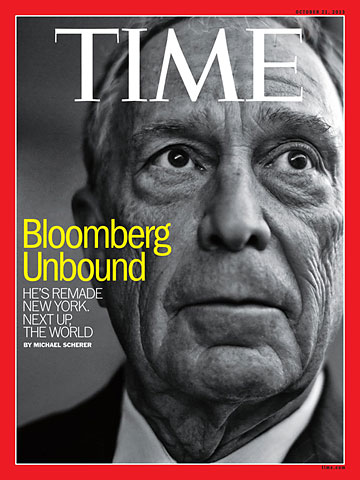
These are the parts of Paris you assume exist but never get to see, hidden behind ivy-clad walls, guarded by armed men and surrounded by black Mercedes. The brother of King Louis XVI once staged his immodest fêtes galantes at this 18th century maison, and the building later housed a literary society founded by Balzac, Hugo and Dumas. Now the 13th wealthiest person in the world is walking in from his chauffeured car, having just arrived on a private pond hop from New York, the city he runs for a few more months.
He starts talking right away about the parts of America that still don't believe in evolution or global warming, how his ex-wife remains his best friend, his aversion to the fanciest restaurants in Paris because, well, they are all just so terribly fancy. White-bread toast, Skippy peanut butter and bacon. That's how Michael Rubens Bloomberg, 71, describes his ideal meal. "The cholesterol will go right to your veins," he cautions, shifting in his polished loafers. Health is on his mind, you see. As mayor, he has banned trans fats in restaurants, made chains post calorie counts and tried to limit the size of sodas people can buy. Now health has brought him to France, where as a cause, it is eating a noticeable chunk of his personal fortune.
Through the grand doors, up the double staircase, into the corner salon that once housed the grand bedroom, a high council has gathered. If Joe Camel and the Marlboro Man once sold themselves as superheroes, this group would be the Legion of Doom: leaders from the World Health Organization, the Campaign for Tobacco-Free Kids and other masters in the international cabal to end smoking. Bloomberg is the guest of honor, the moneyman. And he knows the numbers. "Tobacco is going to kill a billion people in this century unless we do something about it," he says upon entering the room.
For most people, that is just a fact. For a modern billionaire, it might be a call to action. But for Bloomberg, it's a work in progress. A slide flashes on the screen, showing the money he has personally spent against smoking since 2007, a straight-arrow chart pointed out the window over the manicured gardens into the sky: 556 grants, 61 countries, $109,244,391, so far. And that doesn't count the ban on smoking in public spaces that Bloomberg passed in New York City, a policy that took off around the world. You can't light up in Paris bistros or North Carolina taprooms anymore. In New York, adult smoking rates have dropped nearly twice as fast as those nationwide, and life expectancy has climbed three years in a decade. "California actually passed smoking-ban legislation before New York," Bloomberg boasts, "and nobody paid attention."
The team gathered before him has mapped global smoking trends with the precision of a hedge fund gaming currency markets. They know rates are rising in Thailand because of low roll-your-own taxes. They have a plan to end the Chinese tradition of giving cigarettes as gifts. They name the Indian ministers blocking reform because they own bidi factories on the side. This isn't a meeting about more advertising or another lung-cancer hospital. It's about using enormous private wealth to change government policies and shift human behavior. "Nothing any of us will ever do will save as many lives as limiting the use of tobacco products," Bloomberg says.
